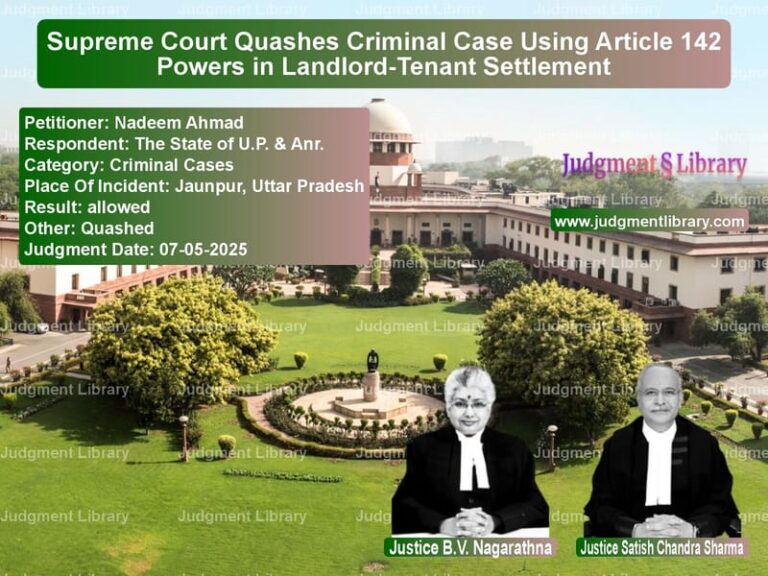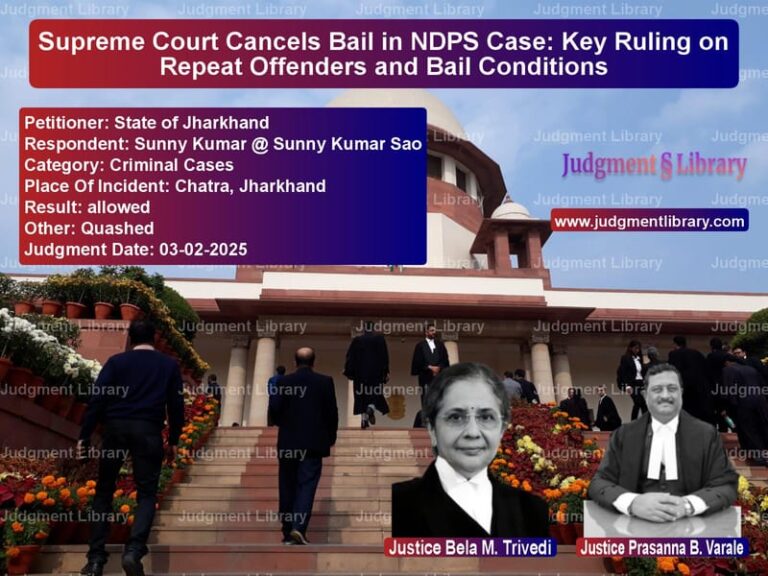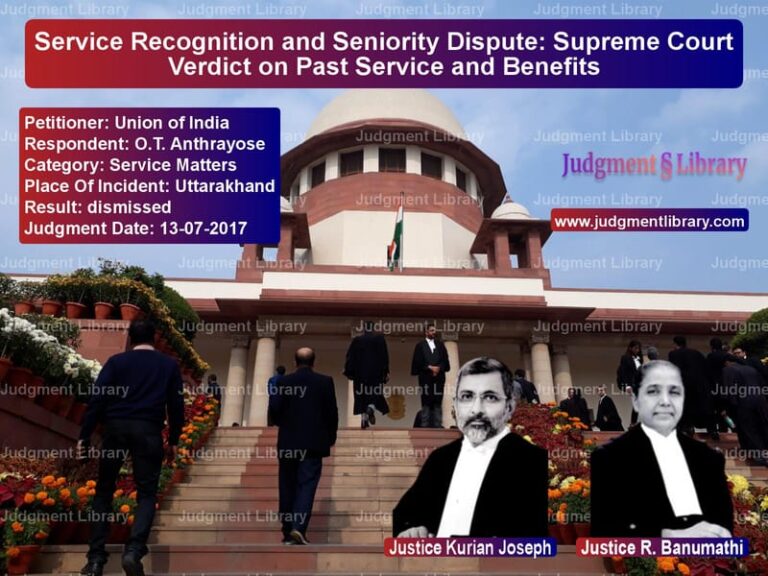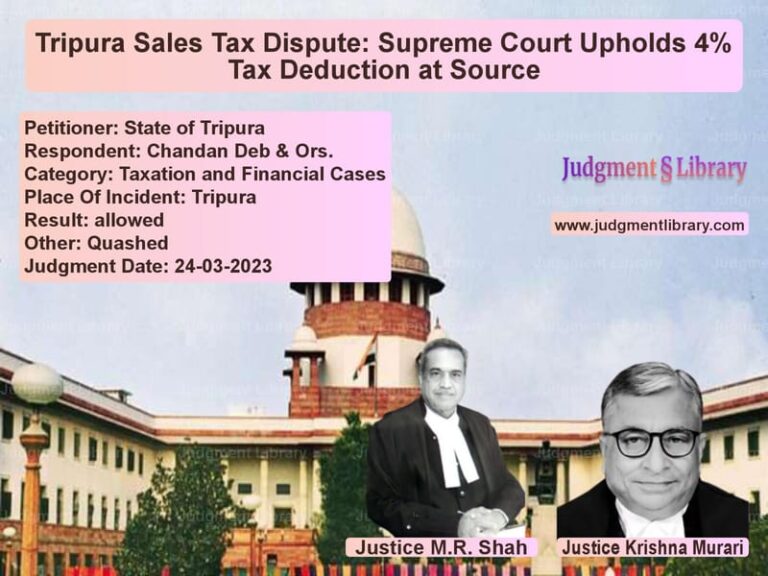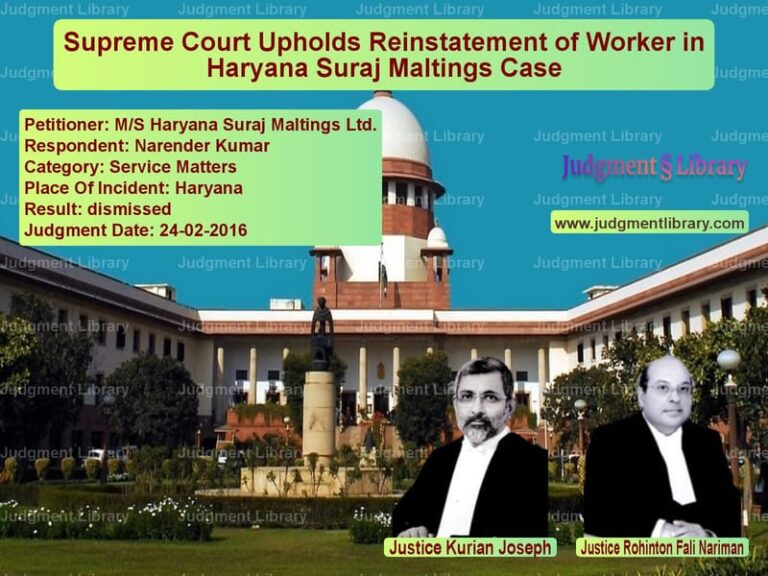Supreme Court Rules on Industrial Land Cancellation in Andhra Pradesh
The case of The Andhra Pradesh Industrial Infrastructure Corporation Limited & Others v. S.N. Raj Kumar & Another revolved around the cancellation of industrial land allotments by the Andhra Pradesh Industrial Infrastructure Corporation (APIIC). The Supreme Court was tasked with determining whether APIIC had the legal authority to cancel industrial plots after executing sale deeds, particularly when the allottees had not utilized the land for its intended industrial purpose.
Background of the Case
APIIC, a public sector undertaking, is responsible for developing industrial areas in Andhra Pradesh and allocating land to entrepreneurs for setting up industries. In 1996-97, APIIC allotted industrial plots in Visakhapatnam and other locations to various transport companies, including the respondents. These companies intended to construct transport offices and godowns.
As per the allotment letters, the allottees were required to establish their industrial units within two years of taking possession. Failure to comply with this condition would lead to the cancellation of the allotment. The relevant clauses stated:
- Clause 10: If any terms and conditions stipulated in the allotment letter are not complied with, APIIC reserves the right to forfeit all amounts paid.
- Clause 17: The project must be implemented within two years of taking possession. If not, the allotment will be canceled.
- Clause 18: Registration of the sale deed will only be done after implementation of the industrial unit.
Despite these conditions, APIIC executed sale deeds in favor of the respondents between 1997 and 1999 after receiving the full sale consideration. However, six years later, APIIC issued show-cause notices to the allottees, citing their failure to establish industrial units and keeping the plots idle.
Respondents’ Defense
The respondents argued:
- APIIC failed to provide basic infrastructure such as roads, water, and electricity, making it impossible to develop the plots.
- The infrastructure was provided only in 2006, after APIIC issued the show-cause notices.
- Once APIIC executed the sale deeds, it transferred absolute ownership of the land to the respondents, and therefore, had no legal authority to cancel the allotments.
- They had applied for construction permissions, which APIIC initially approved in 2006 before later canceling the allotments.
APIIC’s Justification for Cancellation
APIIC contended:
- The sale deeds were subject to compliance with the original allotment conditions.
- The allottees had kept the land idle for years, affecting the industrial development of the area.
- Even though sale deeds were executed, the conditions of use and purpose remained binding on the allottees.
- They later decided to allow the allottees another opportunity to retain their plots but only on the condition that they pay 50% of the prevailing market value.
High Court Ruling
The Andhra Pradesh High Court ruled in favor of the allottees, holding that once APIIC executed the sale deeds, it had no authority to impose further conditions or demand additional payments. The High Court made the following key observations:
- Once the sale deed is executed, the vendor (APIIC) loses all rights over the property.
- Conditions in the original allotment letter become irrelevant after the sale deed is registered.
- APIIC’s demand for 50% of the prevailing market value as a penalty for delay in development was legally unsustainable.
- The doctrine of proportionality applied, meaning APIIC’s cancellation action was excessively harsh.
Supreme Court Judgment
The Supreme Court upheld the High Court’s decision and dismissed APIIC’s appeals. The Court made the following critical observations:
1. Execution of Sale Deeds Confers Absolute Ownership
The Court emphasized that after executing a sale deed, the vendor loses all rights over the property. It cited State of Kerala v. Cochin Chemical Refineries Ltd., affirming that:
“Once the contract is concluded and a regular sale deed is executed, the vendor cannot impose additional conditions or unilaterally cancel the sale.”
2. APIIC’s Demand for Additional Payment Was Illegal
The Court rejected APIIC’s demand for 50% of the prevailing market value as a condition to retain the plots. It ruled that:
“There is no legal basis for such a demand after the sale deed is registered, transferring ownership in favor of the respondents.”
3. Application of the Doctrine of Proportionality
The Court applied the principle of proportionality, holding that APIIC’s cancellation action was excessive and unjustified. It relied on the ruling in Teri Oat Estates (P) Ltd. v. U.T., Chandigarh, which established that:
“Administrative actions must be proportionate to the objectives sought to be achieved. A harsh penalty must be justified by the circumstances.”
4. APIIC’s Failure to Provide Infrastructure
The Court noted that APIIC failed to provide basic infrastructure for several years, which hindered the allottees’ ability to develop the plots. It concluded:
“The appellant cannot blame the allottees for failing to develop the plots when essential infrastructure was not provided in a timely manner.”
Final Ruling
The Supreme Court dismissed APIIC’s appeals and ruled:
- APIIC had no authority to cancel the allotments after executing sale deeds.
- The demand for 50% of the prevailing market value was unlawful.
- The allottees were entitled to retain ownership of their plots.
Key Takeaways from the Judgment
- Once a sale deed is executed, the vendor loses all rights over the property.
- Conditions in the original allotment letter become irrelevant after the transfer of ownership.
- The doctrine of proportionality applies to administrative actions.
- A vendor cannot impose additional conditions post-sale.
- Failure to provide infrastructure cannot be used as a basis to penalize allottees.
Conclusion
This ruling reinforces the legal principle that once an entity sells property through a registered sale deed, it cannot impose additional conditions or revoke the sale based on prior allotment terms. The decision is significant for industrial land policies, as it clarifies the rights of allottees and the limitations of state agencies in land transactions.
Petitioner Name: The Andhra Pradesh Industrial Infrastructure Corporation Limited & Others.Respondent Name: S.N. Raj Kumar & Another.Judgment By: Justice A.K. Sikri, Justice Ashok Bhushan.Place Of Incident: Andhra Pradesh.Judgment Date: 10-04-2018.
Don’t miss out on the full details! Download the complete judgment in PDF format below and gain valuable insights instantly!
Download Judgment: The Andhra Pradesh I vs S.N. Raj Kumar & Ano Supreme Court of India Judgment Dated 10-04-2018.pdf
Direct Downlaod Judgment: Direct downlaod this Judgment
See all petitions in Contract Disputes
See all petitions in Property Disputes
See all petitions in Landlord-Tenant Disputes
See all petitions in Judgment by A.K. Sikri
See all petitions in Judgment by Ashok Bhushan
See all petitions in dismissed
See all petitions in supreme court of India judgments April 2018
See all petitions in 2018 judgments
See all posts in Civil Cases Category
See all allowed petitions in Civil Cases Category
See all Dismissed petitions in Civil Cases Category
See all partially allowed petitions in Civil Cases Category


